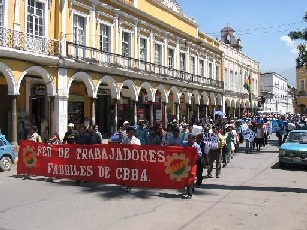Feature:
Bolivians
Elect
Evo
Morales
President
--
Indigenous
Leftist
Coca-Grower
Leader
Wins
Sweeping
Victory
12/23/05
In a surprising show of electoral strength, indigenous coca-grower leader and Movement to Socialism (MAS) party head Evo Morales won an outright victory in Sunday's Bolivian presidential election, gaining 54% of the vote in a field of eight. The majority vote means Morales will not have to face a run-off decided in the congress, where being the leading popular vote-getter does not automatically ensure being named president.
Morales campaigned hard on themes guaranteed to raise hackles in Washington, and relations with the United States are almost certain to be tense and conflictive. He is an ardent critic of US efforts to wipe out coca cultivation and vowed to end forced eradication of crops and move to legalize cultivation of the coca leaf, whose traditional use in the Andes dates back thousands of years. At the same time, he has vowed to go after cocaine producers and traffickers, or, as he put it this week, "zero cocaine, not zero coca." He also called for nationalization of Bolivia's immense natural gas reserves. And he has, at least rhetorically, aligned himself with Washington bogeymen Venezuelan President Hugo Chavez and Cuban leader Fidel Castro as harsh critics of US-style free market economic policies, known as "neoliberalism" in Latin America, and as "anti-imperialist" critics of US foreign policy in general. "For the first time in 500 years, Bolivia will return to indigenous rule," said the Institute for Policy Studies Drug Policy Project's Sanho Tree. "This election is a flat rejection of both the drug war in Bolivia and neoliberalism," he told DRCNet. "I have yet to meet anyone in the Andean countries who actually supports US drug policy in the region unless he is on the payroll." "The election of Evo Morales is the product of our failed drug policy," said Adam Isaacson of the Center for International Policy, a progressive Washington think tank. "The US government is getting what it has coming to it." "The size of Evo's victory is going to make it easier for him across the board for a number of reasons," said Kathryn Ledebur of the Cochabamba-based Andean Information Network. "He is not going to have to make concessions to other parties to form a coalition, which probably would have forced him to water down MAS positions, and he now has more of a mandate than any president in recent history," she told DRCNet. "Winning big doesn't solve all his problems, but it does make things easier."
"I expect Evo to bring eradication down to next to nothing, although he may even increase the emphasis on interdicting cocaine," said Isaacson. "They are currently allowed by law to grow 12,000 hectares of coca in the Yungas, but Evo and the cocaleros have argued that is way too little. For the next six to nine months, they will be studying the size of the legal coca market and looking at legitimate demand. That should determine the amount of coca that can be grown legally," he said. "There is going to be strong debate over eradication," Isaacson continued. "The US basically wrote Bolivia's coca law and has poured a lot of resources into Bolivian police and military eradication units over the years with no great results, but they still won't want to give it up. Evo can probably counteract that pressure, however, by putting more resources into interdiction and going after trafficking and money-laundering, and he may even be able to decriminalize coca production." There is decrim and then there is decrim, said AIN's Ledebur, and trying to suppress the cocaine traffic has been a losing proposition everywhere. "Evo has come out and said that decriminalization of the leaf is not the same as cultivation everywhere," she pointed out. "And he is talking about zero cocaine, but it is the market that determines the extent of coca production, not policy," she said. Another key question is how the US will respond to any coca-related moves by Morales. So far, the official response has been low-key, although threats of decertification rumble ominously in the background. But those threats may be more bark than bite. "If you are Bolivia, the two countries approaching you right now are the US and Venezuela," said Isaacson. "The US is saying 'You better toe the line or we'll decertify you,' while Hugo Chavez is saying 'Hey, you want some cheap oil?' There is also Brazil," Isaacson continued. "Evo has very good relations with Lula, and the two countries have a lot of economic ties." "The US government remains rather circumspect about the whole coca issue, and we hope they continue to do so," said Ledebur. "Now that Evo has been elected, the US reaction is better than it had been in the past," said Isaacson. "The US Embassy had a policy of no contact with Evo, but a high-ranking official will be meeting with Evo within weeks. They are going to try to engage with him," Isaacson predicted. "The US government has to be guarded, as it has been this week, because it is clear US policy in Latin America is in crisis," said Birns. "Whatever direction you look, there are huge problems. On drug policy, the US has given up all hope of maintaining a credible anti-drug policy in the region," he said, pointing to American acquiescence in allowing Colombian paramilitary drug lords to avoid extradition. "That undermines US anti-drug policy throughout the region," he said. "Given the United States' poor track record with international drug policy, the US government has no right to bully other countries to follow our failed model. The ban on international trade of coca-based products has no basis in science or public health," said Ethan Nadelmann, executive director of the Drug Policy Alliance. "Coca deserves the same opportunities to compete legally in international markets as coffee." Birns also pointed to Bolivia's Latin American neighbors as a possible counterbalance to the US. "Venezuela and Brazil should both help out," he said. "Brazil is the major consumer of Bolivian natural gas, and the eastern third of the country is heavily populated by Brazilians. They have a stake in a stable Bolivia. Along with Venezuela, Brazil will make important moves to help Bolivia nationalize. If Morales can do that, he will be in relatively good shape." It is a new era in Bolivia. The country's indigenous people, oppressed for five centuries, are now preparing to govern Bolivia, and they are determined to bring coca with them into the 21st Century. Andean indigenous nationalism has been aroused, as have notions of communitarianism and social justice based on indigenous traditions. Evo Morales has awakened a tiger; now he must prepare to ride it.
|


